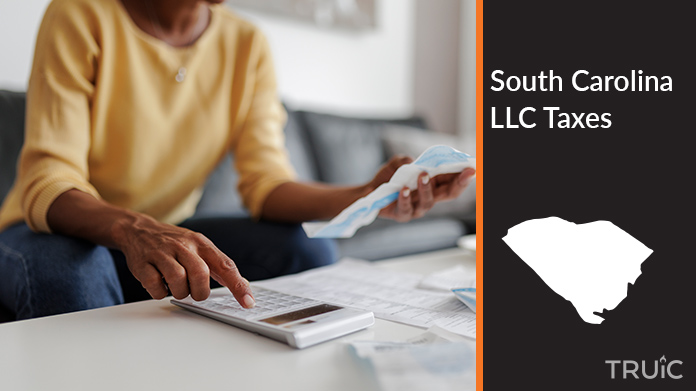South Carolina LLC Taxes
South Carolina’s growing economy and sunny weather make it a popular spot for new businesses. Yet, as more business owners choose to start their ventures within the state, many may find it challenging to understand the business taxes involved.
Regardless of the size of your business, if you operate a limited liability company (LLC) in South Carolina, you’ll need to stay up to date on your finances and pay federal, state, and local taxes. Our guide will help you understand which taxes you must pay for your South Carolina LLC.
Recommended:Schedule a free consultation with an accountantto stay on top of your taxes.

South Carolina LLC Taxes Owed
LLCs benefit from pass-through taxation, which means the business’s profits pass through to its members’ individual tax returns. As a result, your LLC itself doesn’t pay taxes to the federal government or the state of South Carolina. Instead, LLC owners must pay taxes on their portion of the income generated by the LLC.
In South Carolina, LLC owners can expect to pay the following taxes:
Federal Taxes
不管你的生意所在,如果you have an LLC within the United States, you will have to pay federal income taxes and federal self-employment taxes. These taxes are reported on your Form 1040.
Federal Self-Employment Taxes
It doesn’t matter if your LLC is a single-member LLC or a multi-member LLC; all LLC members must pay self-employment taxes on their share of the LLC’s profits. The self-employment tax rate is 15.3%.
Federal Income Taxes
Your federal income taxes will depend on your tax bracket, and the cutoffs for individual tax brackets, as well as the percent owed, will change each year.
South Carolina State Taxes
Each state has its own laws that dictate how it taxes individuals and businesses. Below are some state-level taxes likely to affect your South Carolina LLC.
South Carolina Income Taxes
South Carolina’s state income tax rate is 6.5%, which is fairly average when compared to other states.
South Carolina Sales and Use Tax
The state sales tax rate in South Carolina is 6%. You may, however, have to pay more in some counties or cities due to local sales taxes. The average local sales tax rate in South Carolina is 1.43%.
Register for a South Carolina Sales Tax License
If your business sells taxable goods or services, you must register for a sales tax license with the South Carolina Department of Revenue. Visit theSouth Carolina Business One Stopwebsite for more information.
Additional State Taxes
The South Carolina Department of Revenue oversees the collection of various state-specific taxes businesses may have to pay, depending on their location, industry, and number of employees. A few examples of these additional taxes include:
- Accommodations Tax
- Alcohol Beverage License
- Motor Fuel User Fee
- Other Tobacco Products Tax
- Rental Surcharges
To learn more, visit theSouth Carolina Department of Revenuewebsite.
South Carolina Local Taxes
查尔斯顿的当地法律、法规可能differ greatly from those in Myrtle Beach. Regardless of where you live in South Carolina, we recommend you check with your local jurisdiction to ensure your business obtains the proper local permits and follows any local regulations that may impact its operation.
South Carolina LLC Compliance
You must obey South Carolina’s state and local laws in order to maintain your business in good standing.
South Carolina Annual Report
Unlike many other states, South Carolina doesn’t require LLCs to file an annual report with the Secretary of State. As long as your LLC is taxed as a sole proprietorship or partnership, it won’t require any kind of annual filing to operate within this state.
However, if your LLC is taxed as a C corporation (C corp) or an S corporation (S corp), you will need to file a return. Visit theSouth Carolina Department of Revenuewebsite for more information.
LLC taxes are complex. While our guide can provide you with important information, we recommend youschedule a free consultation with an accountantto ensure you handle your business taxes correctly.